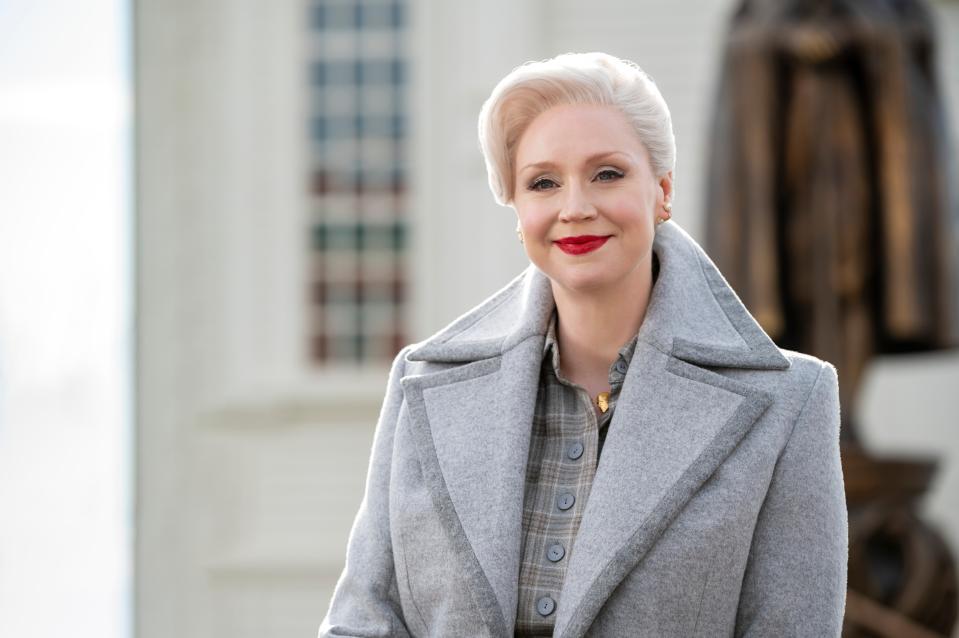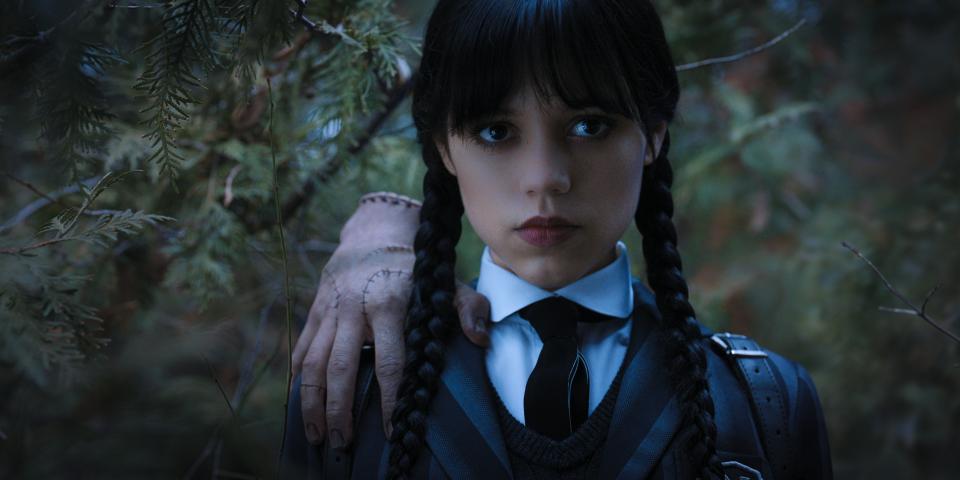‘Wednesday’ Showrunners Break Down Finale Twists, Tease Tyler’s Return and Reveal Season 2 Plans

SPOILER ALERT: This interview contains spoilers from Season 1 of “Wednesday,” now streaming on Netflix.
Wednesday Addams cracked the case. Everyone’s favorite macabre teen made her triumphant return to screens in “Wednesday,” produced by Tim Burton, facing her toughest battle of all: high school at Nevermore Academy.
More from Variety
How Siouxsie Sioux, Bob Fosse and More Inspired 'Wednesday's' Unforgettable Dance Sequence
'Wednesday' Easter Eggs: Breaking Down All the Tim Burton and 'Addams Family' References
The title character, played by Jenna Ortega, spends the majority of the Netflix series’ first season consumed by a murder mystery she believes herself to be at the center of that involves both Nevermore and Jericho, the town in which the school is located.
In the season finale, it’s uncovered that Nevermore teacher Marilyn Thornhill (Christina Ricci, who played the Wednesday character in Barry Sonnenfeld’s “The Addams Family” movies) is actually Laurel Gates, a descendant of Jericho’s founder, Joseph Crackstone. Wednesday reveals the botany teacher’s treachery to Principal Weems (Gwendoline Christie), who gets a poisoned syringe to the throat and dies in Wednesday’s arms.
After collecting body parts using Tyler Galpin (Hunter Doohan), who’s actually the “Hyde” monster terrorizing Nevermore, Laurel revives Crackstone with hopes of ending the outcasts once and for all. A tense standoff with Wednesday’s allies by her side leads to Crackstone’s final downfall, and the capture of Tyler and Laurel.
While the finale provides a satisfying conclusion to the season’s biggest mystery, it still leaves a fair number of questions: Did Tyler escape from custody? Who sent that threatening text to Wednesday’s new phone? And who will take over as Nevermore’s principal?
Showrunners Alfred Gough and Miles Millar spoke to Variety about all of these cliffhangers, as well as the finale’s biggest twists, working with Ortega on the set in Bucharest, Romania, finding a hand magician actor to play Thing — and their plans for further seasons.
I was surprised to see Thornhill revealed as the villain in the finale. Was that character always going to be the villain, or did plans change when Christina Ricci joined the cast?
Alfred Gough: Thornhill was always the big bad. She was the brains behind the whole operation. We actually thought when we cast Christina, it was going to be such a frickin’ blinking red light over her. We were concerned that, “Oh, my God, are people just gonna guess this.” But I think what really helped is that we had great actors and actresses, frankly, in all the big roles. You have Gwendoline [Christie] and you have Riki [Lindhome]. You’ve watched it on television: “I wonder who the villain is? It’s probably the biggest name on the marquee!” In this case, I feel like they were sort of evenly dispersed.
Miles Millar: Obviously, this is our first whodunnit. The idea of people guessing too soon, it’s like you think that she could be, but it’s so obvious, then it’s not. I think it’s like a dance of hopefully an audience guessing until the end. And then once the Riki character is killed, you think OK, well, that’s that done. So it’s just the monster planned by himself. That’s great that you that you were you were taken by surprise. That was definitely our intention. We just loved the idea of the two Wednesdays in that final scene in the crypt. It just felt so delicious and irresistible.

You also killed off Gwendoline Christie’s Principal Weems. What was her response to finding out she was going to die?
Millar: She was such an amazing trooper throughout the whole thing. She loved it, because it felt very surprising. She was totally on board for that. I think for us, it really had landed with Wednesday, the emotional impact of that death. We wanted this world where people you care about die, so that there is a cost and a sacrifice that this story takes on her. She was incredible. That relationship between Wednesday and Weems is probably one of the strongest in the show. I think they’re so good together. We always love the scenes with them together in the office with the height differential, and it just feels like two really strong female characters who have actually an unspoken respect for each other. It just feels like a really sad but impactful way to end this and the first season with her death.
Let’s talk about Tyler. In those final moments of the season, he’s in custody, but we see him start to Hyde out. Does that leave the door open for a Tyler return in a potential Season 2?
Gough: Yeah. Absolutely. He’s out there. That’s what we wanted to convey.

Do you already have a structure of what you want Season 2 to look like if you are renewed?
Millar: Yeah. For us, it’s always looking at the future, and when we sit down to create a show, it’s looking at multiple seasons, ideally. That’s never expected, but that’s the anticipation that hopefully the show is successful. So you always lay out at least three or four seasons’ worth of potential storylines for the characters. It can evolve and change. Often, you want to see which characters or cast pop and who you like to write for. So you want to keep it open and organic enough to change it and evolve, but we certainly have a pretty clear runway of what we want to do in future seasons.
Wednesday stays true to the character audiences love, but still shows emotional growth through the season. How did you plan out that journey?
Gough: That was really the hat trick. The North Star was that Wednesday always had to be Wednesday, but she did have to have a journey. It’s a slight arc, but it’s definitely an impactful arc. When you get to the end, and you see the hug with Enid—
Millar: We love that that’s the arc. Her season arc is a hug. But it’s so impactful. I think, hopefully, that moment between those to characters is really the emotional climax of the show. It was certainly designed that way, and I think the audience will be surprised by how much that means to them. To see these two characters hug, it sounds so small and trivial in a normal show. In this one, it’s actually hugely important to Wednesday’s emotional journey.
Jenna Ortega brings a wide emotional range while not blinking and staying mostly deadpan. What was it like working with her?
Gough: She’s a very intuitive actor. When we met her, she just had the thing that Wednesday needed. That’s a hard thing to describe, because we saw hundreds and hundreds of young actresses for the role. You met her on Zoom and you just kind of knew it. And then Tim got on, and we all know it. She was the one. I remember having lunch with her in with her when she was in Los Angeles, and she talked about her posture, and she talked about the not blinking. I think it’s a role you have to inhabit. I don’t want to speak for Jenna , but I do think it’s a role that in a weird way becomes a little method, because you have to live in that space. And she’s in 95% of the show.
Millar: In terms of process, we’d meet with Jenna every morning in the trailer, go over the scene, and often just cut lots of dialogue and really reduce it. Tim talks about her being very much like a silent movie star. A lot is in the face in the eyes. That’s a window into Wednesday’s real state of being, in terms of what she says is not necessarily what she feels. Jenna was one of those rare actresses who really can convey so much and say nothing. It was a marathon for her. She was in virtually every scene, learning reams of dialogue every day. Archery, canoeing, sword fighting. It’s a lot of physicality as well as a lot of words to learn. The show looks very breezy, but it was a very challenging show to make.

Thing is really a breakout star of the series. How did you approach this character and decide to integrate him into the story so much?
Gough: When we were developing the show, it was in the script. Thing is so unique to the Addams Family that we thought we couldn’t have an Addams version of the world you’re exploring [without] Thing in there. It’s easy to write it on the page. To actually translate that on the screen, we found an actor who’s a close hand magician.
Millar: He’s a Romanian magician who does card tricks, basically. So he has incredible dexterity. We did a lot of auditions for hand people. Tim was very, very involved with this. He was sort of obsessed with Thing. It was a lot of time spent actually rehearsing and getting the sign language with our visual effects supervisor. In our studio, they had actually an old Romanian puppet theater from Romanian TV shows with puppets. And so they’d rehearse in this puppet theater and come back and have video of what he was doing. So it was really intricate and very intentional in terms of making him feel bizarrely complex and real. So I think that that moment where you see him stabbed to the column was a risk, because we wanted that to be — for Wednesday — so emotionally devastating. In the wrong hands, it could have been incredibly cheesy and like, “Oh, my God, really?” But I think it really works because of Jenna’s performance, and because you really do at that point believe he’s sentient, and that he has feelings and all those things. It was a risk we took, and I think it paid off.
Wednesday is given a phone at the end of the season. Might we see her texting in Season 2?
Millar: I think our idea is that she throws the phone out the window in the next beat. I just don’t think she ever got to use a phone. I think she’s maybe vaguely tempted or amused by it. But then she’s going to reject it.
Gough: Thing basically takes the phone. He’ll become a TikTok star in Season 2.
This interview has been edited and condensed.
Best of Variety
Sign up for Variety’s Newsletter. For the latest news, follow us on Facebook, Twitter, and Instagram.


